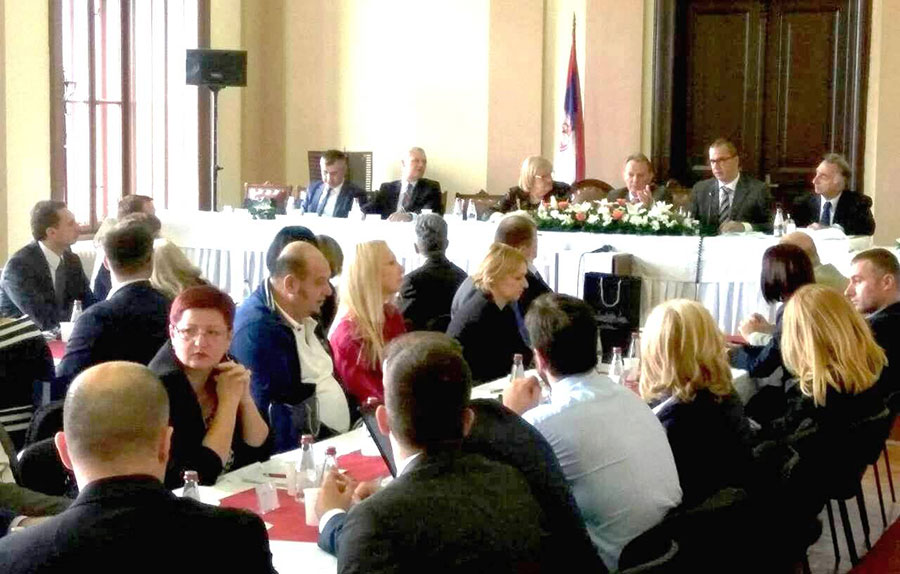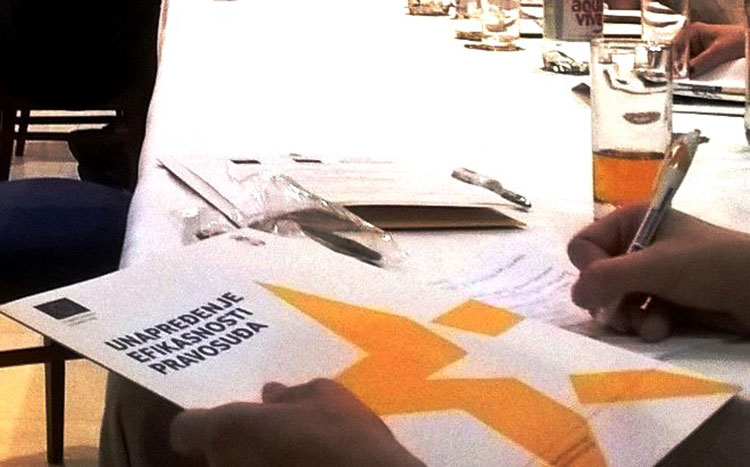Basic Court in Zrenjanin today hosted the meeting of High Judicial Council Working Group for case weighting methodology. The event gathered the members of the Working Group, led by President of the Supreme Court of Cassation and the High Judicial Council Dragomir Milojevic, and representatives of courts participating in the pilot phase of methodology implementation.
Basic Court in Zrenjanin is the first to implement this segment of the EU-funded project “Judicial Efficiency” committed to helping courts in Serbia improve their performance and supporting the High Judicial Council Working Group for case weighting methodology. Development of said methodology is one of the obligations the Republic of Serbia has assumed under the Action Plan for Chapter 23.
The Working Group met for the first time on 21 April and approved the methodology at the next meeting on 10 May. The methodology has later been formally adopted by the HJC to be implemented in 20 courts.
Prior to development of the case weighting formula, the “Judicial Efficiency” project Experts analysed over 100,000 cases from the AVP database and additionally over 1,000 cases manually in order to properly detect main events in cases which may influence case duration in each particular case type.
The application of case weighting formula ensures a balanced distribution of cases in both number and weight and places an equal burden on judges. 80 per cent of the analysed cases have been labelled as moderately difficult, whereas 20 per cent have been classified as difficult.
 Welcoming the participants, president Milojevic thanked the Delegation of the European Union to the Republic of Serbia and the “Judicial Efficiency” project for previous cooperation and achieved results.
Welcoming the participants, president Milojevic thanked the Delegation of the European Union to the Republic of Serbia and the “Judicial Efficiency” project for previous cooperation and achieved results.
“We have gathered today to discuss whether the Formula came to life and what the results are. It is hard to put an equal burden on all judges at the national level, given that there are major cities with courts that, compared to courts in smaller towns, have more cases. The tendency is to place an equal burden on judges within the same court. If the assessment of the pilot scheme comes out positive, the High Judicial Council will make the appropriate decision and expand its implementation to all courts in Serbia,“ Milojevic said.
“Every judge thinks that he or she always gets the most difficult cases. I was once criticised for being given the easiest cases. And as I have made it to the Supreme Court, I like to say that I can make any case easy, no matter how difficult it might be. So, everything will be up to judges, regardless of the number of difficult cases in each court,” said Novica Pekovic, President of the Appellate Court in Novi Sad.
High Judicial Council has some up with a case weighting formula to be applied in 20 courts taking part in the pilot stage of implementation. Basic Court in Zrenjanin was the first to apply the formula in June, which is why it hosted the meeting of the Working Group.
“Today, we will review issues related to the weighting of the formula and take further steps to improve the implementation of case weighting,” said Zlatoje Ankic, President of the Basic Court in Zrenjanin.
The importance and practical benefits of the applied methodology – balanced distribution of cases in both number and weight that ensures equal burden on judges and helps in improving the courts’ efficiency – were noted by all participants who expressed their readiness to continue to actively cooperate in further activities. The open discussion and analysis of the current issues led to positive conclusions and directions for further development and improvement of the methodology.
The newly introduced Formula and its implementation also attracted great attention of both media and public. Mayor of Zrenjanin Cedomir Janjic also attended the event, saying that he “recognised the need to support the projects designed to improve the modus operandi the public institutions or local self-governments have towards citizens.“




